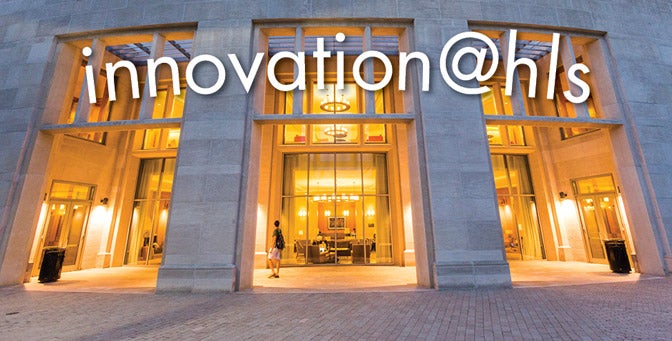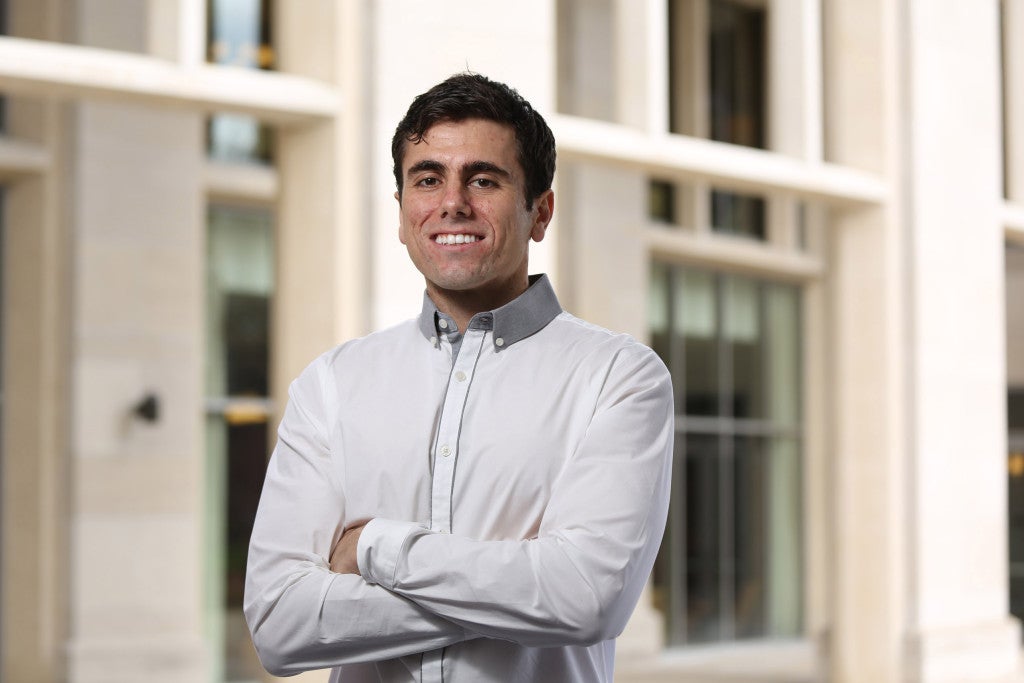
The moment Shant Hagopian ’15 stepped through the doors of the Harvard Innovation Lab, the air was abuzz with the energy of wildly creative ideas, and he knew Harvard Law School had been the right choice for him.
“The first time I walked into the i-lab I thought, ‘Wow, this is a really cool place,’” says Hagopian, a native of California who came to HLS with an interest in startups and business. “The i-lab brings together students from many different academic backgrounds to launch their ideas for how the world should look in the future.”
The i-lab, a collaborative workspace and idea incubator at Harvard University which champions entrepreneurship and innovation, connects students, faculty, and other creative idea-makers from across the university to resources, thought leaders, and funding sources. Since launching in 2011, it has drawn scores of law students who’ve worked on a wide variety of cutting-edge projects—some law-related, and many not.
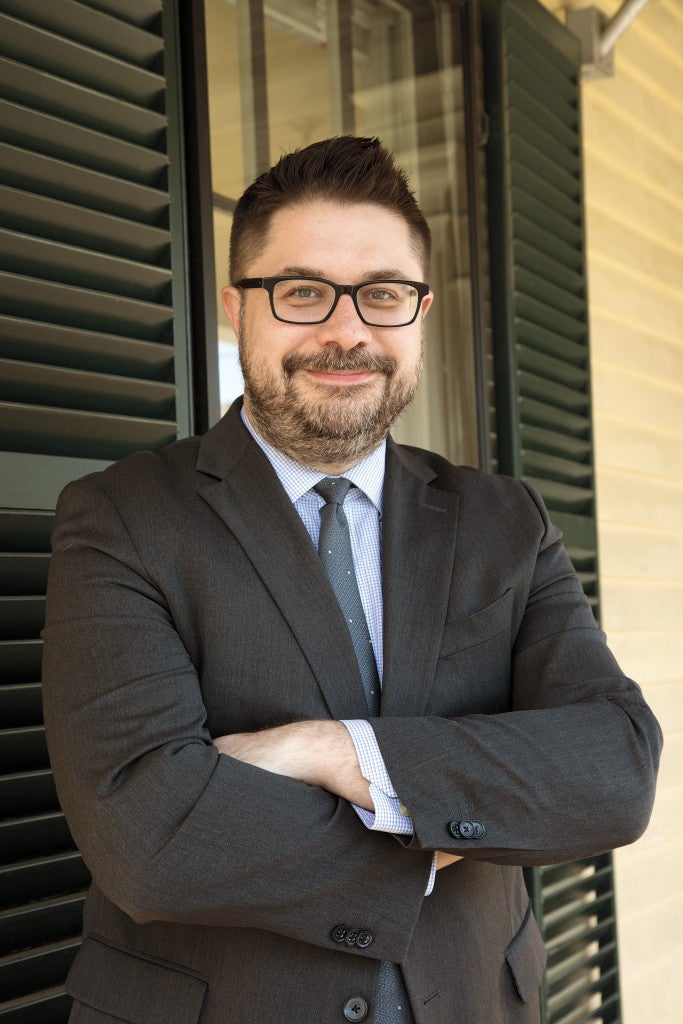
Credit: Martha StewartChris Bavitz, Clinical Professor of Law and managing director of the HLS Cyberlaw Clinic at the Berkman Center for Internet & Society
“Anyone with a Harvard ID can tap in, sit down, and do their thing,” says Chris Bavitz, Clinical Professor of Law and managing director of the HLS Cyberlaw Clinic at the Berkman Center for Internet & Society, and Dean’s Designate to the i-lab. “That means anything from having shared space to work to looking at a physical bulletin board where people are looking for a software developer or lawyer. Nearly every night of the week, there’s programming about venture capital or how to deal with employment issues or any number of other legal and business concerns that startups face.”
As a 2L in the HLS Transactional Law Clinics , which holds office hours at the i-lab where law students give legal advice to entrepreneurs, Hagopian found himself wanting to make the leap to the other side and become an entrepreneur himself.
Just a few months later, he did—as a co-founder of Virtudent, a tele-dentistry startup created by a friend, Dr. Hitesh Tolani, a graduate from the University of Pennsylvania School of Dental Medicine. Hagopian introduced Virtudent to the i-lab, where doors quickly opened and connections were made. Last year, Virtudent, designed to increase oral health care access for underserved populations, was a finalist in the 2014 President’s Challenge, which offers a $100,000 prize for the most innovative idea for solving a complex societal problem. Though it didn’t win the grand prize, Virtudent received initial funding from Harvard and will soon be rolling out.
“Getting connected to the i-lab was one of the best decisions we’ve made for the company,” says Hagopian, who will be working in Silicon Valley next year. The i-lab introduced Virtudent to venture capitalists, Harvard Business School professors, and the dean of the Harvard Dental School, with which Virtudent will be working. “If it wasn’t for the i-lab, our company wouldn’t have evolved as quickly as it did. Harvard’s intellectual and innovative capacities are centered at the i-lab, and it’s amazing to be there.”
For law students interested in entrepreneurism and startups—as entrepreneurs themselves, as lawyers representing startups, or both, like Hagopian—there is a wealth of growing and intersecting opportunities at HLS and across the university.
HLS offers a number of academic courses and clinics that connect students to entrepreneurial ideas and startups, including the Transactional Law Clinics, the Cyberlaw Clinic, and the Food Law and Policy Clinic. The Entrepreneurs-in-Residence program exposes HLS students to cutting-edge leaders in innovation who teach courses and act as mentors, while the Berkman Center for Internet and Society , based at HLS, is a university-wide focal point for a vast variety of research and other efforts in technology and innovation.
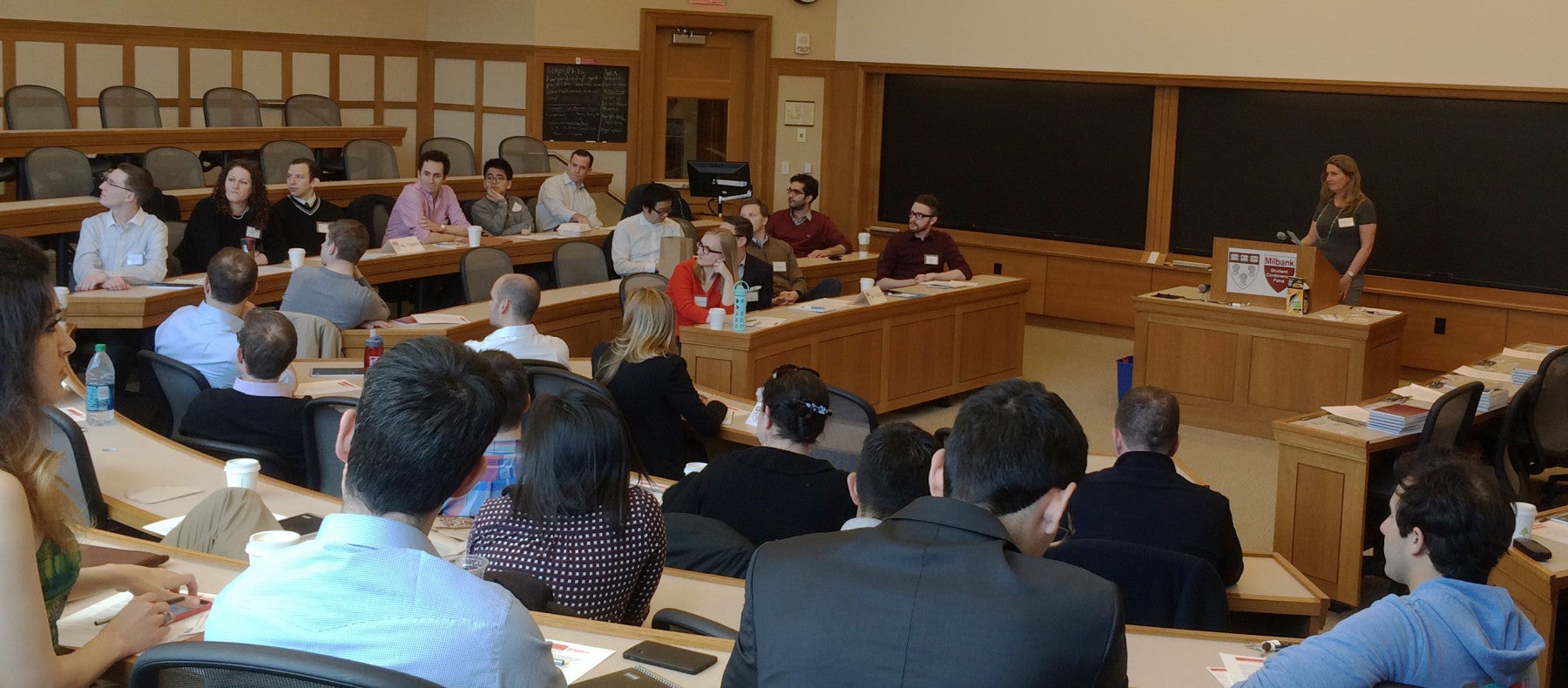
The Harvard Law Entrepreneurship Project is a student-based organization where students work for start-ups under the supervision of an attorney who is general counsel for a venture capital firm. On April 11, HLEP hosted their 2015 Conference: Legal Negotiations Along the Startup Lifecycle, which brought together 16 attorneys to problem solve and share their experiences with students in small groups. Attorneys and participants shared their solutions after working in small groups to solve hypothetical legal problems.
First-year law students can jump in right away doing legal research for entrepreneurs at MIT and Harvard through the Harvard Law Entrepreneurship Project, a Student Practice Organization where they work for start-ups under the supervision of an attorney who is general counsel for a venture capital firm. And the Public Service Venture Fund, the first program of its kind at a law school, funds startup nonprofit ventures for Harvard Law students and alumni, awarding up to $1 million in grants every year to graduates pursuing careers in public service.
“Between Berkman and the clinics and the Harvard Innovation Lab across the river, a whole slew of things have come together. The breadth of what we offer here is really unparalleled,” says Bavitz, co-director of Berkman. “The opportunities are limitless.”
As home to numerous universities and tech companies, and with city governments interested in using technology to address civic problems, Cambridge and Boston present even more opportunities. “With the Harvard Business School being nearby and other universities like MIT, BU, and BC, and with way more resources at HLS, I felt I could get a better experience here,” says Hagopian, who considered law schools in California.
At the i-lab, HLS students have been central to a number of projects, some of which are now businesses. Patrick Ho ’12 was part of an i-lab team of Harvard University students that won the President’s Challenge in 2012 with Vaxess Technologies, which bioengineers vaccines so they can be shipped and stored without refrigeration. Ho now serves as its VP of operations and legal affairs. And John Bennett ’13 is founder of Zen Way, Inc., which offers free and low-cost tools for online self-study for the LSAT and other tests.
Each year, the i-lab runs a series of challenges to spur and reward innovation. The President’s Challenge, sponsored by the office of Harvard President Drew Faust, offers a $100,000 grand prize; and there are separate Deans’ challenges at different schools. This academic year marks the first time HLS has presented a challenge, the Food Systems Challenge, with the strong support of Dean Martha Minow, who has also championed the i-lab. In collaboration with the School of Public Health, the food systems challenge is being overseen by HLS’s expert on food law, Emily Broad Leib, who co-founded and directs the HLS Food Law and Policy Clinic, the first food law clinic in the country. The challenge calls upon students to develop ideas to make the food system healthier, more sustainable and more equitable.
“The number of opportunities for students to get involved in fledging enterprises or start their own has gone through the roof in the last several years,” says Broad Leib, Deputy Director of the HLS Center for Health Law and Policy Innovation. “In the food space in particular, because we have so many challenges—health, environmental, social justice—there’s a lot of need and space to innovate. We’re trying as much as possible to create space for that through the i-lab and through our clinic.”
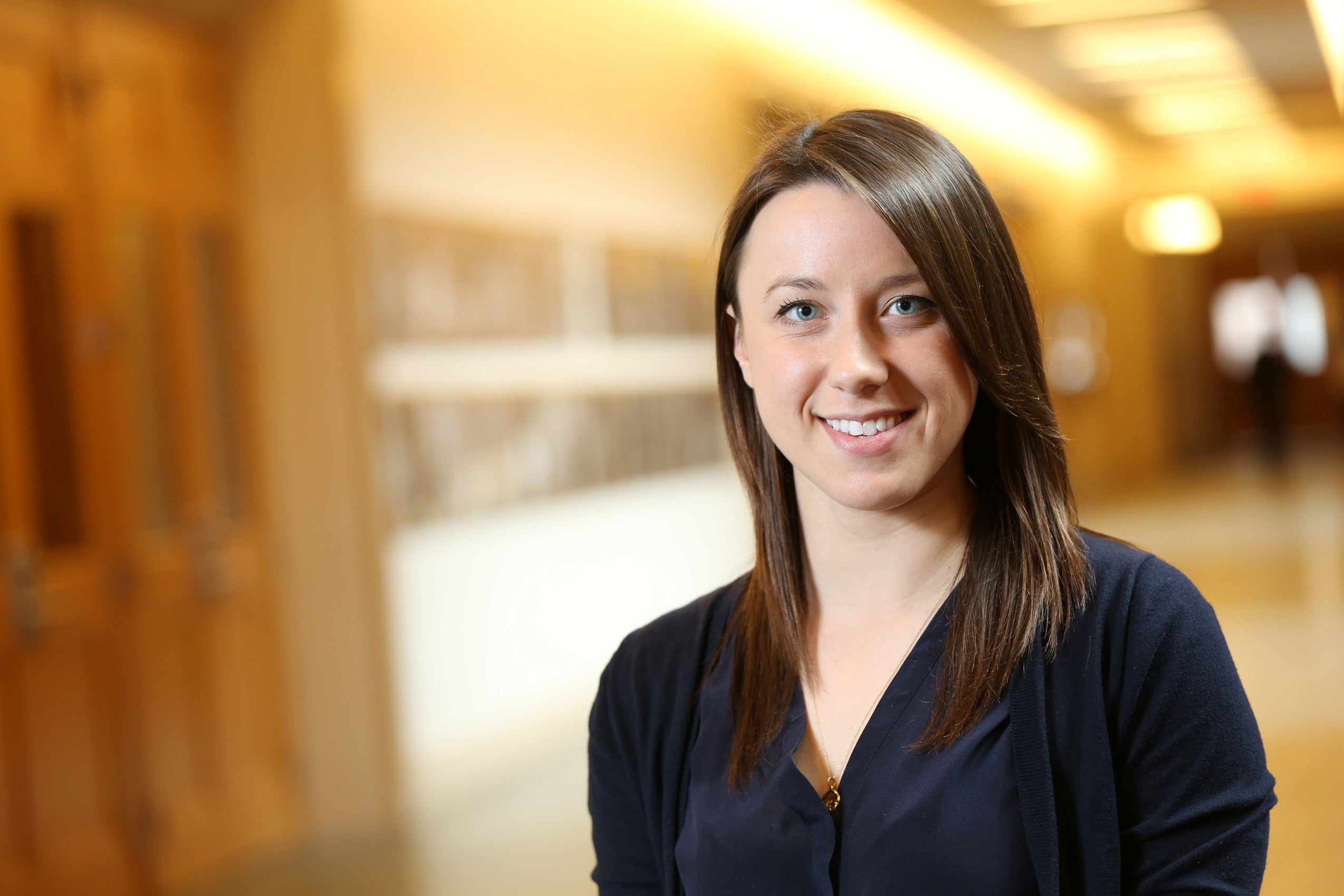
Credit: Heratch PhotographyAs a Transactional Law Clinic student this semester, Sarah O’Loughlin ’16 is providing legal services to Agora, a virtual town hall for political discussion founded by a graduate of Harvard Business School and the Harvard Kennedy School.
What’s especially exciting, students and faculty say, is the cross-pollination across Harvard and throughout the Boston area. Students in the Food Law Clinic are working with entrepreneurs at MIT on a startup to reduce food waste. Berkman has a huge overlap with the MIT Center for Civic Media, and is working with it on the MediaCloud project, which has developed an open data platform allowing researchers to answer quantitative and qualitative questions about the content of online media, including questions about which sources cover particular stories, the language used by media outlets in covering stories, and how stories spread from one outlet to another. And students in the Cyberlaw Clinic are working on a bitcoin project in collaboration with students at the MIT Sloan School of Management.
The Cyberlaw Clinic continues to skyrocket in popularity. Next year, it is expected to comprise five supervisors overseeing nearly 60 students working on a wide variety of projects. Among them will be Susan Crawford, whom Bavitz calls a “rock star in technology and communications.” Crawford will be joining the HLS faculty as a Clinical Professor.
The International Human Rights Clinic is piloting a clinical project this semester on social entrepreneurship in human rights. Through a peer review model, three students are examining how to solve a particular human rights problem through social innovation, and developing concrete proposals for change. In collaboration with Tyler Giannini, Clinical Professor of Law and clinic co-director, two students are working on issues related to gender-based violence, and the third on a project related to business and human rights. Giannini, a special advisor for the HLS Public Service Venture Fund, helped incubate a new business and human rights non-profit, the Institute for Multi-Stakeholder Initiative Integrity, with Amelia Evans LL.M. ’11. [Read interview with Evans on launch of MSI Integrity.]
The Transactional Law Clinics, under the direction of Clinical Professor Brian Price, have been connected to the i-lab since it opened. Under the supervision of Joseph Hedal, deputy clinical director, students in the TLC hold office hours at the i-lab and give presentations on basic legal issues, and some of the entrepreneurs they meet become full-representation clients of the clinic. Through the i-lab, clinical students have worked with students and others from the business school, the engineering school, the school of education, the Kennedy School, the undergraduate college, and more.
“Our students are getting great exposure to entrepreneurs,” says Price. “They often comment about how amazed they are by all this brilliant thinking about new ideas. It’s really good for them to be part of the incubator space and see the role that law students can play.”
As a TLC student this semester, Sarah O’Loughlin ’16 is providing legal services to Agora, a virtual town hall for political discussion founded by a graduate of Harvard Business School and the Harvard Kennedy School. Agora first connected with the clinic through the i-lab and now has become a full-representation client of the clinic, where students have helped it with licensing agreements and other legal needs. “One of the great things about working with entrepreneurs or startups is meeting people with really interesting and cool ideas and trying to get them off ground,” says O’Loughlin. “It’s really intellectually engaging to be involved in idea you haven’t thought of yourself.” She’s enjoyed it so much that this summer, she’ll be clerking with a Boston law firm that represents tech and bio-tech startups.
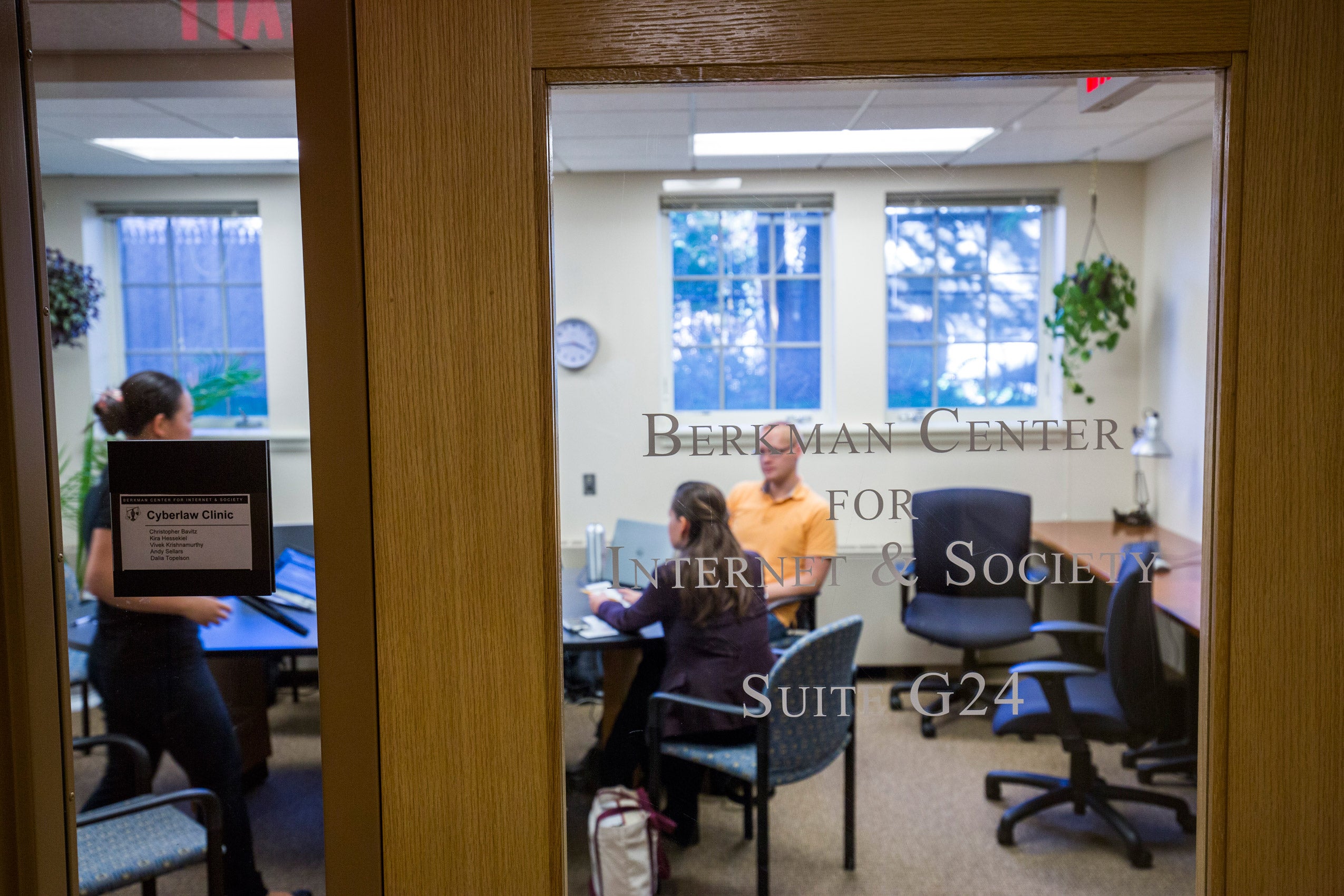
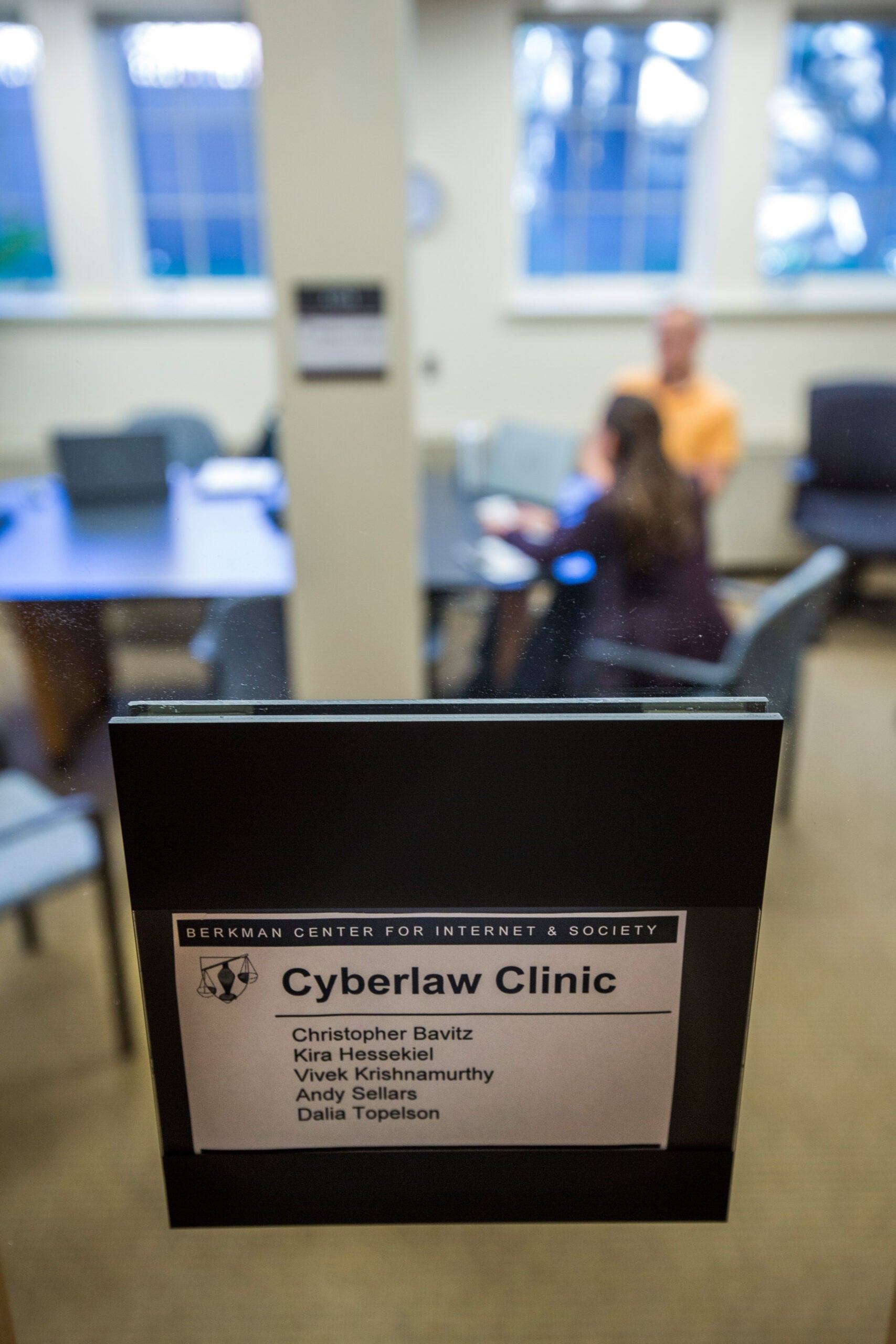
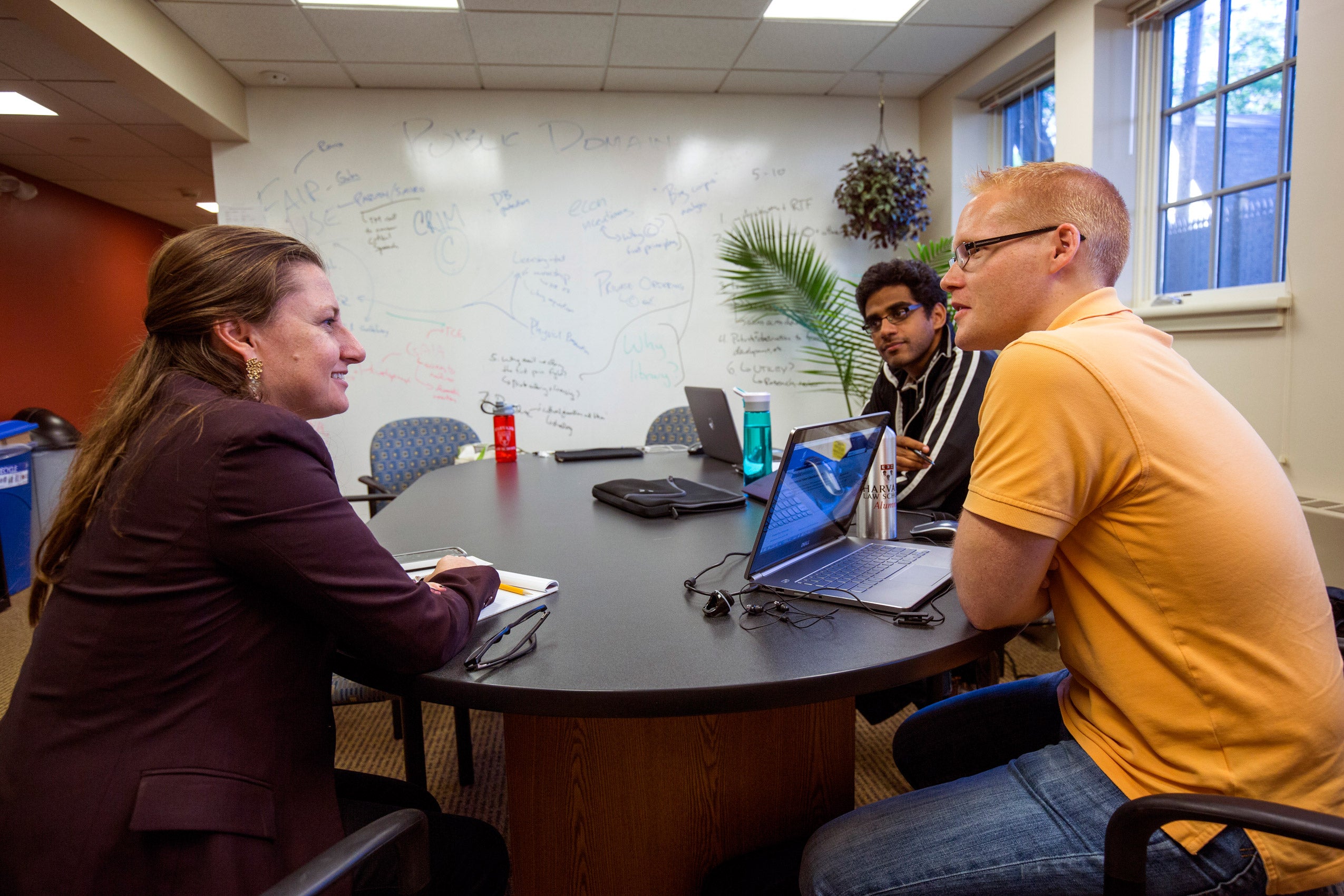
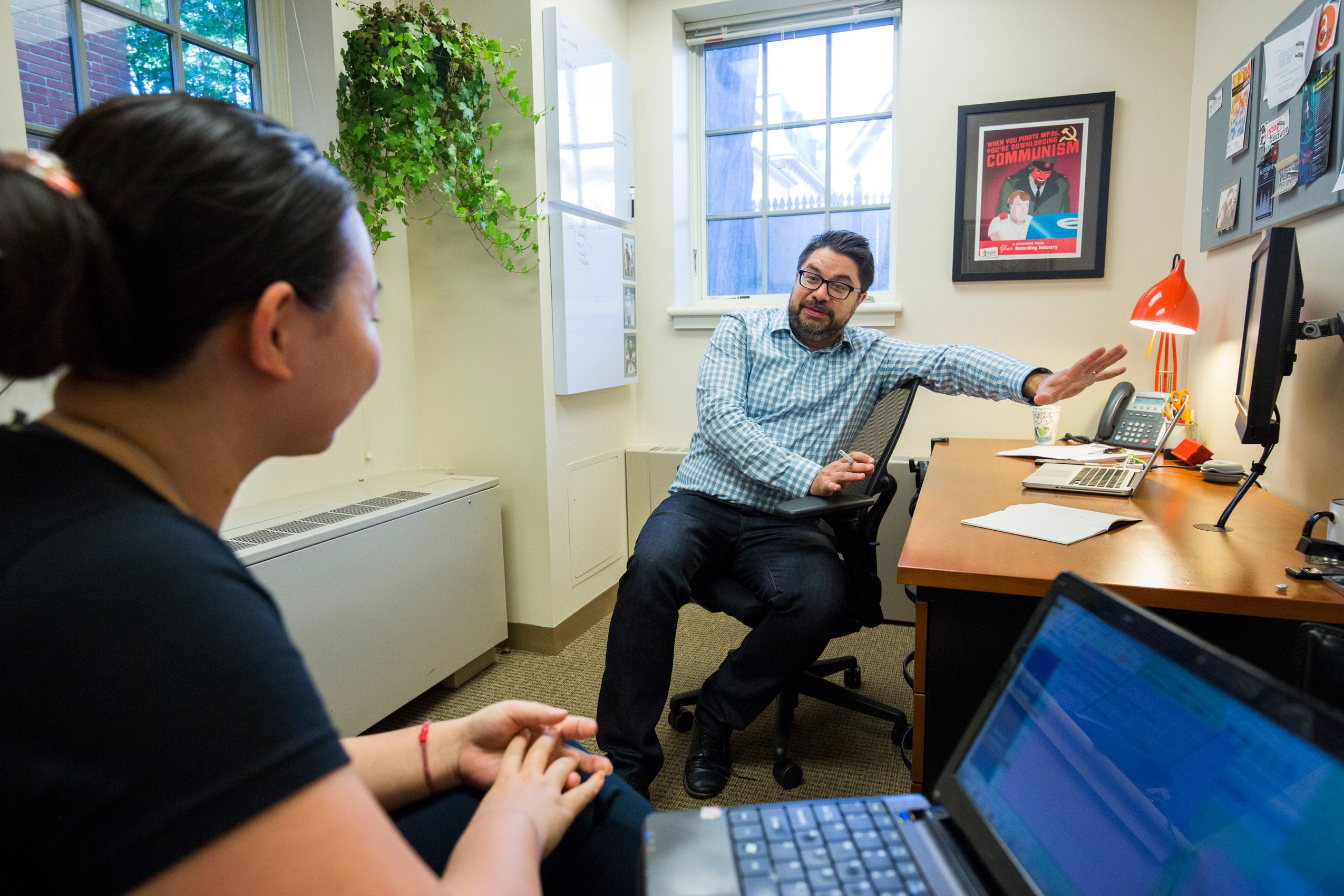
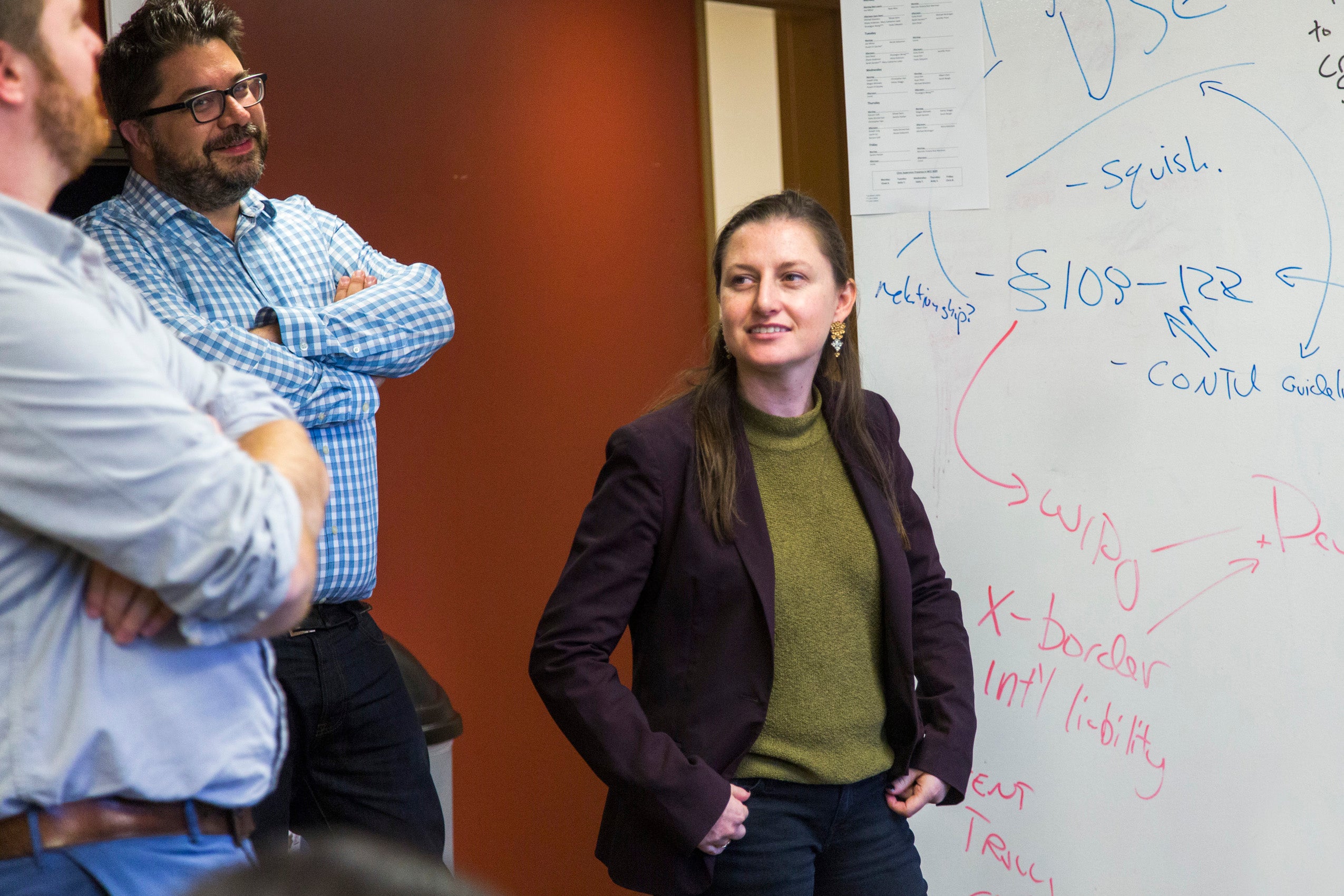
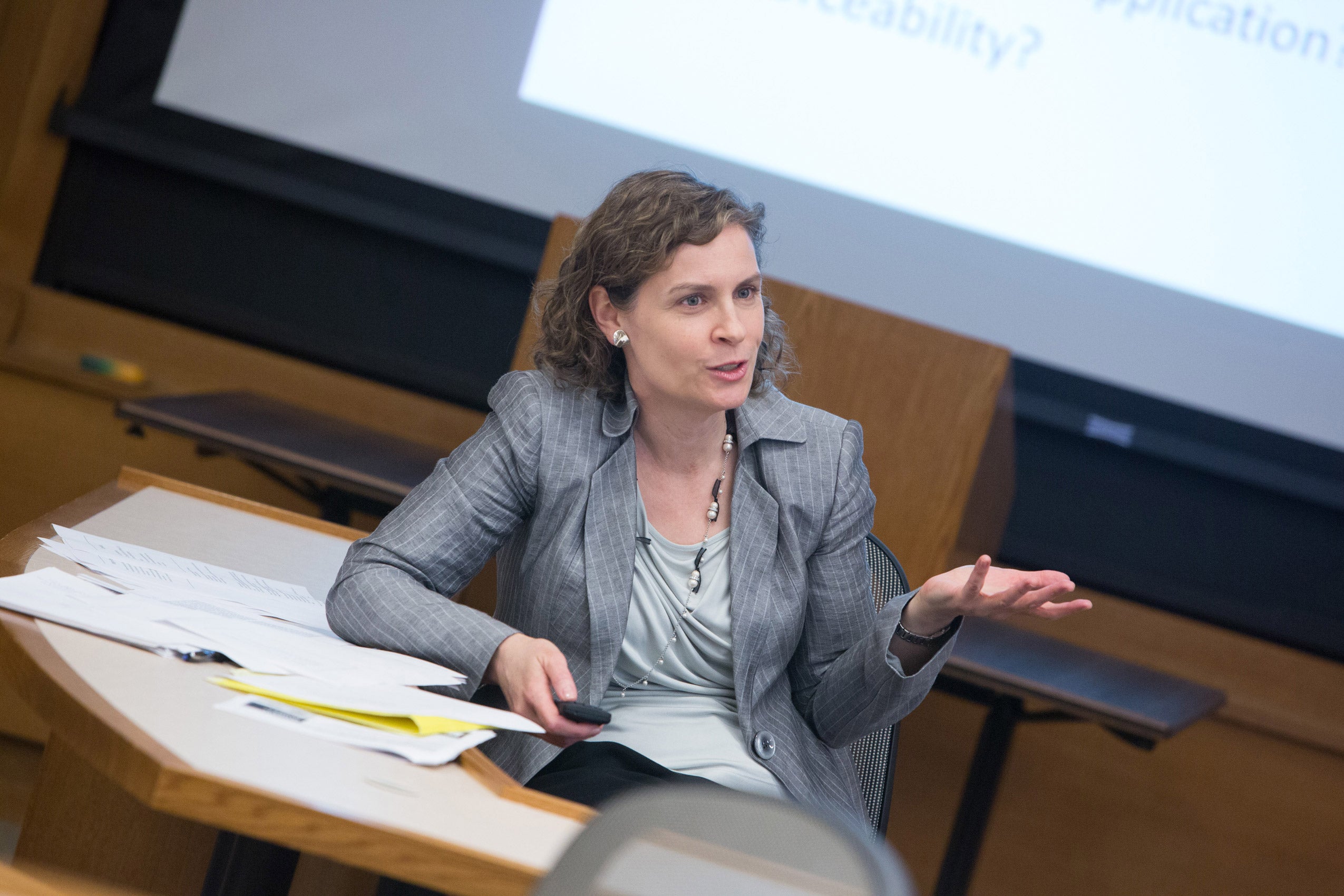
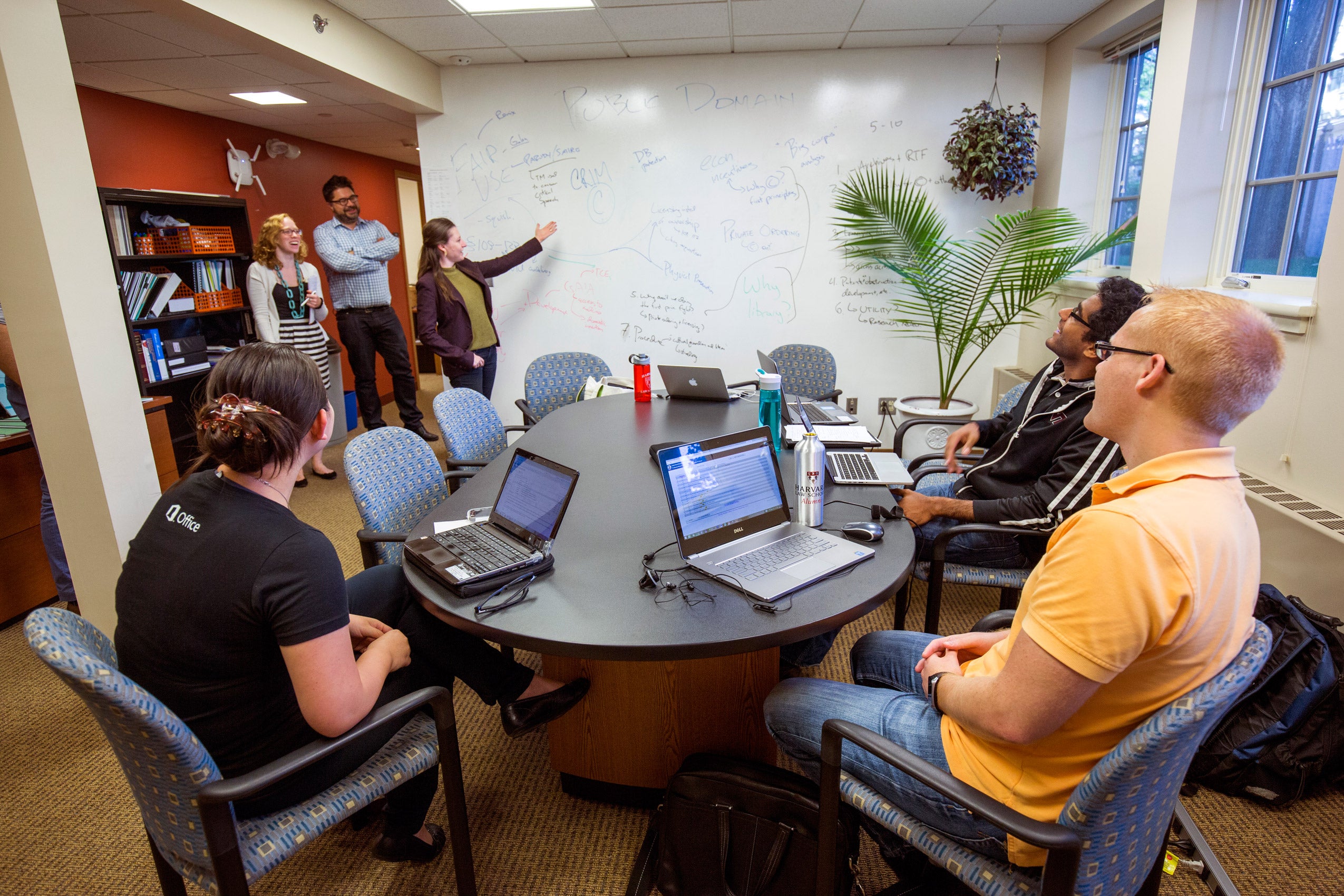
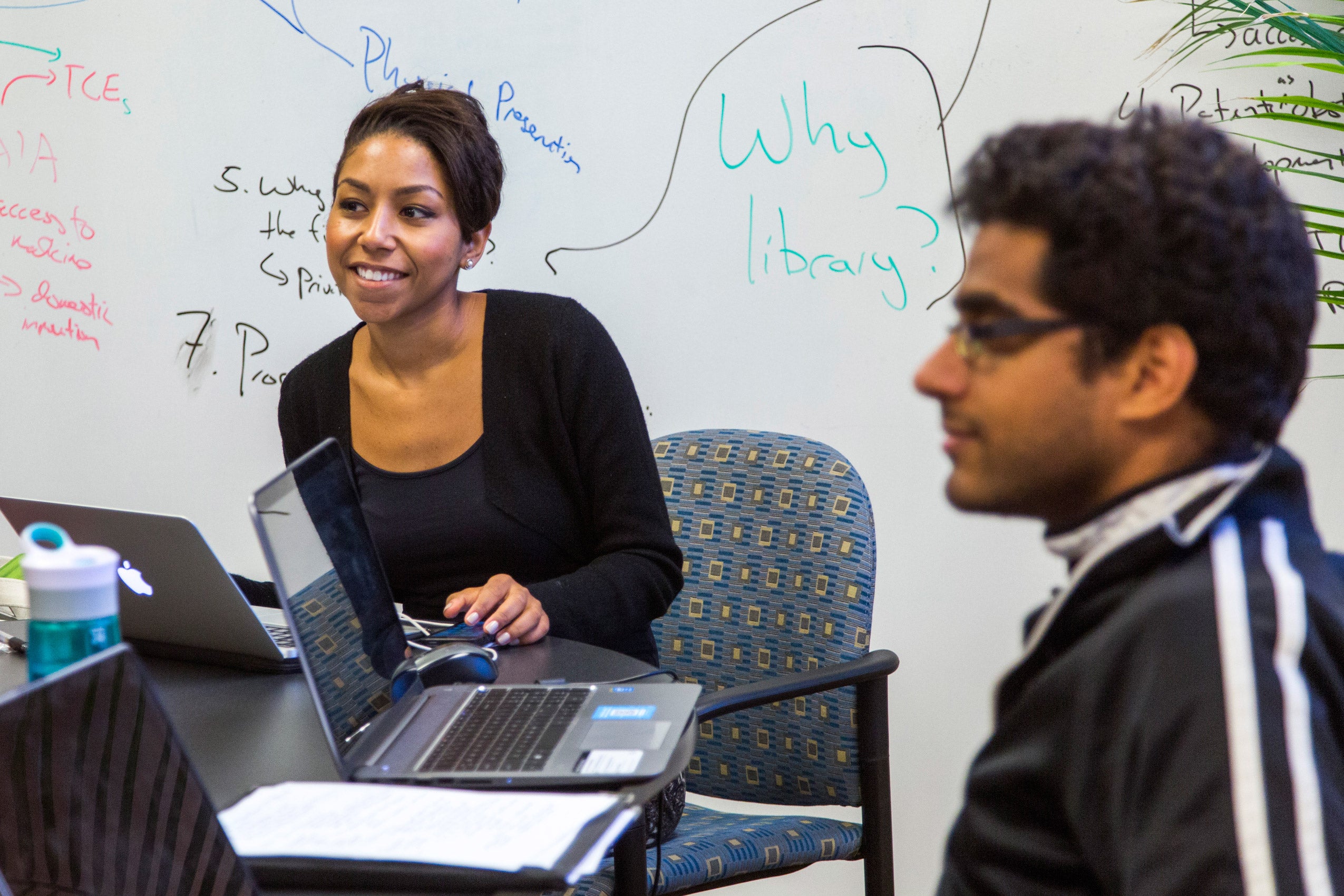
“It’s pretty rich, and a fun intellectual environment to be in,” says Bavitz. “It’s just a really exciting time here for issues around innovation and technology.”
VIDEO: A Week in the Life at HLS
April 2: Jonathan Zittrain, ‘Love the Processor, Hate the Process: The Temptations of Clever Algorithms & When to Resist Them’
On the occasion of his appointment as the George Bemis Professor of International Law at Harvard Law School, Jonathan Zittrain delivered a lecture entitled, “Love the Processor, Hate the Process: The Temptations of Clever Algorithms and When to Resist Them.”
March 31: Chris Kelly, ‘Navigating the Change from a (Relatively) Unrecorded to a Recorded World’
On March 31, the Harvard Law School Dean’s Office and the Berkman Center for Internet & Society co-sponsored a talk by Chris Kelly, Steven and Maureen Klinsky Professor of Practice for Leadership and Progress, and former Chief Privacy Officer of Facebook.
April 3: Richard Tofel, ‘Investigative Journalism in the Digital Age: A recovering lawyer reports’
On Friday April 3 at Harvard Law School’s Wasserstein Hall, Richard Tofel, president of the independent investigative journalism organization ProPublica, gave a talk on investigative journalism in the digital age.
April 14: Neil Flanzraich, ‘FDA’s Impact on Pharmaceutical Regulation’
Neil Flanzraich ’68, Chairman and CEO of Cantex Pharmaceuticals, Inc., was appointed by Dean Martha Minow as an Expert in Residence at the Harvard Innovation Lab (i-lab) in fall 2012. At a lecture sponsored by the Petrie-Flom Center for Health Law Policy, Biotechnology, and Bioethics at Harvard Law School, Flanzraich discussed the balance between speed and safety in FDA’s regulation of pharmaceutical products, including how FDA’s approach has ebbed and flowed over time, the various tools FDA has introduced to reach this balance, and the potential impact of FDA’s various approaches on products and companies, especially start-ups.
